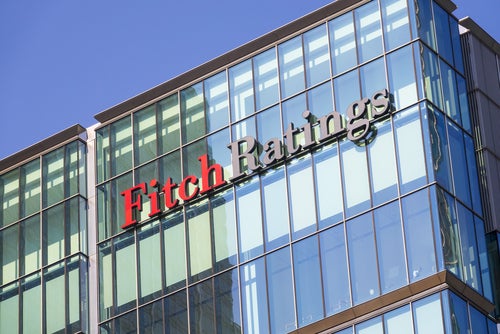Last year was a good
year for De Lage Landen. The global lessor took a 51% jump in
profit – the most significant gain across all of parent group
Rabobank’s business divisions – a 12% growth in income and an 8.3%
increase in total portfolio. Grant Collinson spoke to its chief
executive, Ronald Slaats
 Grant Collinson: What made
Grant Collinson: What made
2011 such a good year for De Lage Landen?
Ronald Slaats: The leasing business is a simple
business; if your income is over-budget and your costs and risk
costs are under-budget, then all the lights are green. In
residuals, our costs were under control, and our risk costs were
below our historical average. Of course, our income has been pretty
good, because our portfolio grew. We grew more than we expected at
the beginning of 2011.
GC: What are the
factors behind this unexpected growth?
RS: In the
Netherlands and in a lot of parts of Europe there is a crisis. I
don’t see that crisis on a global scale; people still invest. In
Canada and the United States, Brazil, China, Australia and Germany,
people are investing and they are investing in leasing. In the
United States, one-third of all investments in capital goods is
through leasing. I see it not only in countries, but in the sectors
we are in. So, it is not that one country or one sector is growing
more than the others – it is across the board that we have sold
more. We have also gained, not just from more rental income, but
from the return of assets.
GC: There are not
a lot of European leasing companies with a strong presence in the
countries you mentioned – the US, Canada, Brazil. Would you say the
global reach of DLL has given you an advantage?
How well do you really know your competitors?
Access the most comprehensive Company Profiles on the market, powered by GlobalData. Save hours of research. Gain competitive edge.

Thank you!
Your download email will arrive shortly
Not ready to buy yet? Download a free sample
We are confident about the unique quality of our Company Profiles. However, we want you to make the most beneficial decision for your business, so we offer a free sample that you can download by submitting the below form
By GlobalDataRS: Yes,
exactly. The global scale of De Lage Landen – we are in 35
countries – is certainly not a disadvantage. Our biggest country is
the United States, our third biggest [by volume] is Brazil, within
Europe it is Germany.
GC: You mentioned
Germany was not as badly affected by the eurozone crisis, has it
been a strong performer for you?
RS: We did
grow a lot there but I don’t think we grew enough. We did grow a
few percentages above the European market average so we did well
but I’m not completely satisfied.
GC: You said in
the statement which accompanied the release of De Lage Landen’s
results that you had improved the quality of your portfolio. Could
you elaborate on that?
RS: The
numbers are looking good – the portfolio has grown and we are
keeping our costs under control. You would expect, with the
eurozone debt crisis, that people would pay less and that they’d be
slower in paying, but we don’t see that. The average customer is
not deteriorating, and the quality of the end user is, in fact,
increasing. Also, customers which are already with us are not
deteriorating either. Therefore the quality of our portfolio, and
of our product, is increasing. Again, that is balanced across all
sectors, otherwise you are growing on account of one or two big
countries.

GC: You’ve
experienced growth across DLL’s divisions, Vendor Finance,
Financial Solutions and Athlon Car Lease, but Vendor Finance
performed the strongest. Is that the strategic focus?
RS:
Financial Solutions is mainly based in the Netherlands and in the
Netherlands the growth is not so great although we did grow above
average in FS and Vendor. Athlon Car Lease, a bit less, but that’s
because we are in nine countries and some of those are very mature
markets and in Europe car leasing is a pretty mature product so the
room for growth is not huge. If you want growth in car leasing you
need to go to other countries.
GC: Is that
something you plan to do? Take Athlon to some of the other
countries you operate in?
RS: No. We
don’t exclude the possibility but it is not at the forefront of our
minds.
GC: Let’s look at
some of these countries you are in expanding in. You are increasing
business in Turkey, Chile and India. When did you start operations
in these countries?
RS: Chile
was in 2011. In India, we are busy but we are looking for a broader
licence and Turkey we will start this year. I reiterate we are not
starting in countries because we like those countries but because
our vendors asked us to. If we have a vendor partnership in seven
or eight countries then there is an obligation if the company come
to us and say they want to start in Turkey or India to at least see
if there is a business case for us.
GC: How do see it
panning out in Turkey? Are there a lot of business opportunities
beyond the relationships you already have?
RS: Yeah,
there is a lot of business there. We have agreements with four or
five vendors, and if we are there, other existing partners will
say, ‘hey are you in Turkey’ and our sales people will tell our
customers too.
GC: Turkey is
this year but you started in Chile last year. How has business been
there?
RS:
Business has been good but Chile is a small country so we haven’t
had huge volumes. Especially from a food and agriculture business
perspective it is an interesting market and we are satisfied with
development.
 GC: That brings us neatly to agriculture. Your parent bank
GC: That brings us neatly to agriculture. Your parent bank
Rabobank is traditionally heavily involved in agriculture. Is that
still a major focus for DLL or have you found yourself moving into
other areas?
RS: Around
27% of our portfolio is food and agriculture but we are quite large
in other sectors – 18% in office technology, nearly 15% in
construction, transportation and industrial. So it is well-rounded.
Do I want to grow only or mainly in food and agriculture? No, but
with a parent like Rabobank it wouldn’t be very smart to forsake
all those relationships, and all that knowledge and experience. A
lot of new developments in leasing are coming out of other sectors.
For example, in financial lease products, you see price-per-day,
price-per-copy, price-per-treatment, price-per-unit,
price-per-hour; these kinds of concepts are much more developed in
other areas and sectors and we try to cross-pollinate and to
introduce them in to other sectors.
GC: Let’s look at
2012. How has business been so far this year?
RS: The
first the two months were a lot busier than we thought. We thought
we’d grow double digit again but we have ended up in the teens. The
first two months were above budget and were, in terms of new
business perspective, cost and risk, very good.
GC: Do you see
that continuing for the rest of the year? What are your
expectations?
RS: New
business will remain strong – I don’t see it deteriorating. Risk
cost – I don’t see it creeping up yet. The cost of funding may go
up a bit because we have grown so much – Rabobank allows us to grow
and they also want to fund that, but we are growing at a rate that
is quite high. If you grow 10% year after year, the cost of funds
tends to go up.
GC: How does the
relationship with Rabobank work? De Lage Landen seems to get quite
a lot of independence, maybe more than other major bank-owned
lessors.
RS: I
cannot talk about other bank-owned lessors but Rabobank is very
supportive. We are independent but we don’t look for that
independence too much. It is great to have a parent like Rabobank
who has, for example in food and agriculture, a global position
which creates many opportunities so it would not be smart not to
look into that. On the other hand, Rabobank has understood that
leasing is a different animal than financing or giving a loan. I
think that is maybe not always there with other banks.
GC: Are there any
challenges or potential challenges ahead in 2012?
RS: New
regulation is a concern – Basel III, lease accounting, national
legislation coming up. Our industry is getting overregulated and
sometimes there are contradictions in the regulation and it appears
to be form over substance. I don’t get thrilled by all the
regulation. Sometimes I think people try to correct what is not
broken. We, as a company, are doing the same things as we did five
years ago so we didn’t create any crisis and still we have this
regulation coming on to our shoulders. I have to ask myself, ‘What
the heck did we do wrong to get this kind of treatment?’
GC: Do you have
strategy in place to deal with these issues?
RS: In
Europe, through Leaseurope, and in the United States, through the
Equipment Leasing and Finance Association, and in other countries
where we operate, we try to influence. We try also to do that on an
international level but it is pretty difficult for the finance
industry to get a voice in the regulation discussion because
apparently we are seen as banks and you know as well as I do that
banks are not looked upon favourably.
GC: Do you think,
not just De Lage Landen, but the industry as a whole needs to
change its perceived reputation?
RS:
Change is maybe a strong word but, yes, we have to get the
perception out there; we have to explain better what we are doing
and that is not only for the regulators but for attracting new
talent. We are a people-based company so if we don’t find the right
people how can we grow healthily into the future? I think we as an
industry need to continue to respond and I think the trade
organisations are doing very good work. For example, the work of
Leaseurope on lease accounting is terrific. However, this type of
work needs more attention from the industry.
GC: Any final
remarks?
RS: Am I
worried about portfolio, am I concerned about appetite for leasing?
I don’t see a lot of issues. It is strong. Maybe across Europe, in
some countries, there is a bit less demand than we like to see but
globally there is a lot of appetite for leasing.
Correction: In the original version of this
article, the table De Lage Landen results 2011 contained
an error. The total income, total portfolio and net profit figures
for 2010 were given as €1.3bn, €29.5bn and €304m respectively.
These were the figures for 2011 and the correct 2010 figures were
placed in the 2011 column. This table as now been amended.







